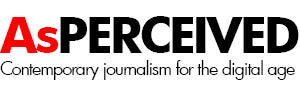‘Never ascribe to malice that which can be explained by incompetence.’
Napoleon Bonaparte
‘Never ascribe to malice that which can be adequately explained by ignorance’.
Oscar Wilde
AS PERCEIVED is a (news) magazine for the digital age with a critical outlook, especially towards those in public life whose actions and statements challenge credulity.
Life, politics, business and art exist only as we perceive them; writings here may be responses to what is apparently happening – and how others’ actions are portrayed and thus perceived.
Many among the world’s population do not have easy direct access to the primary sources (of news), such as political and business decision-makers and policy-makers. The internet has changed, and is still changing, this.
Most of us therefore get information that has been processed and re-presented at least once – by web media, radio, television, magazines and newspapers, and less immediately by books, cinema, theatre and other communications media.
Thus the ‘perceptions’ recorded here are predominantly those provoked by both medium and message.
The name AsPerceived was chosen because so much comes from secondary sources.
Writers and journalists are consumers of the media as much as anyone else, whose views of the world are based on perceptions of the information we get from those other media, primarily television, radio and newspapers.
Some material – primarily the News reported here – comes from the events that AsPerceived writers do attend.
However, we are also aware that the number of newspaper and television journalists actually at events is also increasingly limited. Much material on many broadcasters’ websites comes from the Press Association (PA), as does the national and international news in many regional newspapers in the UK.
(Our instinct is to consider ‘data’ journalism sceptically, to leave overtly promotional press releases to others who may also ‘chase what’s trending’ on social media. Editorial scrutiny, looking for the reasons behind what’s reaching the public domain, remains important. In representative democracies, governance – as the US Founding Fathers appreciated – must be based on distrust while the function of such systems requires questioning, if not always ideally educated or informed, electorates.)
Material from PA, Reuters, the Associated Press – the ‘wire services’ – is fed directly to computers on journalists’ desks as well as other e-devices.
Reporters are sent to events which news editors know about in advance – such as press conferences, court cases, council meetings and parliamentary debates. Some spend their time telephoning automatic information services provided by services such as the police and fire brigades. Other ‘newsgatherers’ then chase such leads to collect material for newspaper, radio or television reports.
Consequently, AsPerceived writers may – like many journalists and commentators – be three steps removed from actual events. That said, our perceptions remain valid as primary responses to the information we see and how we react and respond to it.
In line with the National Union of Journalists’ Code of Conduct requirement that fact is not misrepresented as comment, only material linked from the News index should be considered as fact rather than conjecture or comment.
Nearly all AsPerceived material is available for syndication.
